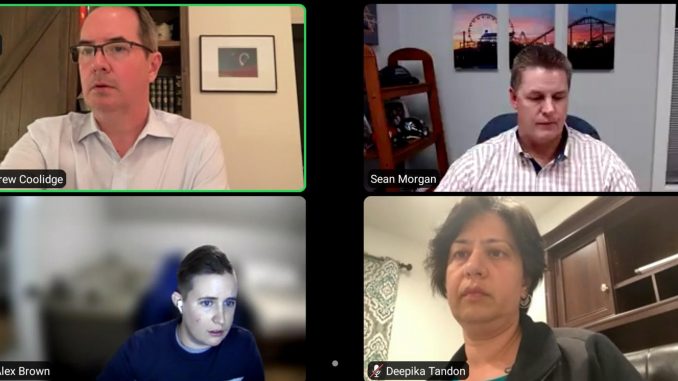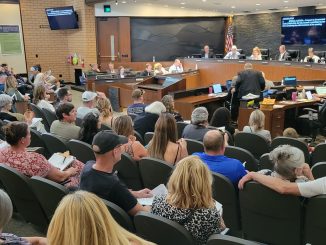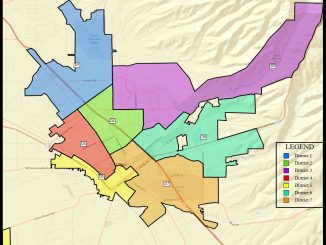
At each meeting over the past two months, when the Chico City Council has convened over Zoom amid the omicron-fueled surge of COVID-19 cases, many public speakers have criticized the city for this precautionary measure and called for a return to City Council Chambers. They’ll get their wish next month, Mayor Andrew Coolidge announced at the start of the council meeting Tuesday night (Feb. 15): March 1, in-person sessions will resume.
Any goodwill momentum from that news quickly dissipated, though, as everything else discussed over the next 3½ hours—even seemingly positive developments, such as a resolved labor dispute and the city’s birthday—drew detractors. Council members also couldn’t get behind a proposal despite offering some praise.
The latter came from Fire Chief Steve Standridge involving advanced life support services. Standridge recommended that the city replace Butte County as the local authority for ambulances within Chico. He cited a list of advantages, from operational (greater control over response time and dispatch) to financial (funding for more city firefighters trained as paramedics).
The chief noted some risks—most notably, legal. He explained that the city attorney’s office based its assessment, that the city could supplant the county, on case law from other states (Chico would be breaking new ground in California). Meanwhile, the contract with Butte County EMS runs through June 2023, so the county’s bidding process will start soon and the window of opportunity is small.
Three residents who submitted letters via the city’s comment portal, Engaged Chico, expressed concerns about the proposal and encouraged the council to take more time in reviewing it. Councilman Sean Morgan amplified that position, saying that “the community was caught off guard seeing this come up as an action item” on the agenda. “On top of that, there’s a few other big things going on in the city right now … the council and staff can only handle so much change.”
Councilman Michael O’Brien, whose time as Chico police chief overlapped with the fire chief, said, “I applaud Chief Standridge being creative, [but] I’m not quite ready to vote on this and support it until we have more discussion on the council level.”
The virtual dais concurred, calling on Standridge and City Manager Mark Orme to revisit the proposal.
Safety
Differences arose almost immediately at Tuesday’s meeting. Councilwoman Alex Brown pulled two of the four items off the consent agenda (matters which are considered routine and typically passed in a single vote). While satisfied with explanations about grant funding for a potential traffic-flow project at Hegan Lane, she dissented from her colleagues on Chico Police Chief Matt Madden’s request to move $341,975 from his department’s staffing budget to fund technology upgrades—and, later, broke from the majority on another law-enforcement motion.
Vice Mayor Kasey Reynolds had requested the city draft a letter supporting Assembly Bill 1599, which would bring back to California voters Proposition 47, the Safe Neighborhoods and Schools Act of 2014. Madden told the council that the law’s reclassification of certain drug and theft crimes from felonies to misdemeanors has led to more crime while removing the incentive for successful interventions such as drug court.
Brown cited data indicating levels of crimes covered by Prop 47 increased for a time but have since decreased. O’Brien raised an alternate concern, overdose deaths.
Ultimately, on Morgan’s motion to send the letter (seconded by O’Brien), Brown voted “very respectfully, no.” Morgan voted “very respectfully, yes”; O’Brien, “normal yes.”
On the next item, though, Brown and Morgan shared common ground. Both expressed reservations about a request from Coolidge for the Bidwell Park and Playground Commission to review park rules. The mayor cited closing time, weapons, drug-free zones, signage, bike/road safety, noise and code of conduct.
Brown questioned the need, asking Madden and Coolidge about the ordinances and policies in place. Morgan, put off by the prospect of “a can of worms” opening, said he wouldn’t want to see a complete revamping of policies but rather a bullet-point list of “biggest bang-for-the-buck” suggestions.
Saying she “appreciate[d] the clarity of the motion,” Brown joined the unanimous vote to refer a “broad strokes” review to the commission.
Other items
In another unanimous decision with a caveat, the council approved a new contract with workers in the SEIU Trades and Craft Unit. These employees had not received a raise in 12 years; dressed in their orange safety garb, a Public Works contingent came before the council Dec. 7—the last in-person meeting—to make a direct appeal.
They receive a 9 percent raise over the three years of the pact plus a one-time incentive payment of $5,000 each “in recognition of the arduous and hazardous work” they’ve done during the pandemic. Rob Berry, local lawyer and leader of the Facebook public-safety group Chico First, criticized the bonus; he said rewarding this group of city workers, without regard to specific duties, unfairly overlooks other employees in front-line jobs.
The whole package passed 6-0, with Councilwoman Deepika Tandon disqualified because she’s related to an SEIU worker.




Be the first to comment